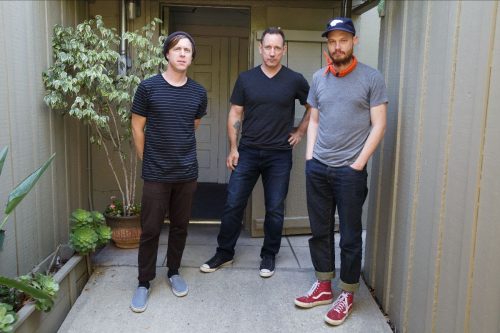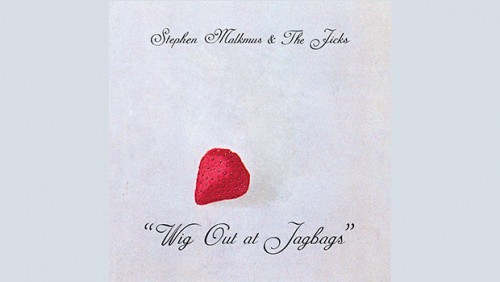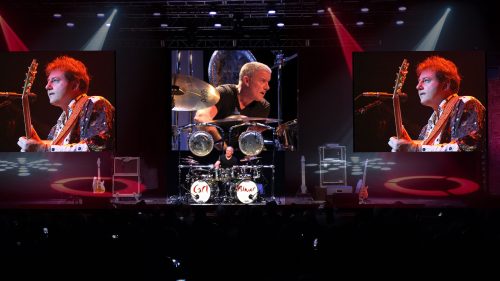For all of the drummers who were intimidated by Jimmy Chamberlin’s intricate parts on Smashing Pumpkins’ albums, you’ll be happy to know he’s just like you.
Chamberlin remembers playing at a drum festival in London, “and I was feeling really good about how everything was doing.
“And I turned to my right, and standing to my right, right under the drum riser was Bull Bruford” of Yes and King Crimson legend. “I almost vomited and dropped my sticks at the same time.”
Speaking to Chamberlin, who on Sept. 25 released the Jimmy Chamberlin Complex EP “Honor,” you get a sense of the thread from the jazz greats like Elvin Jones and Tony Williams, to progressive rock players like Bruford and Carl Palmer, to Chamberlin and his generational peers like Danny Carey (Tool), Stephen Perkins (Jane’s Addiction), Matt Cameron (Soundgarden and Pearl Jam) and Tim “Herb” Alexander (Primus).
“Oh yeah, those guys are all dear friends of mine,” Chamberlin says. “Danny and I are super tight. I just saw him when he came through town. We’re both kind of car bugs. Matt Cameron from Soundgarden was always another friend, I always saw Stephen Perkins, Dave [Grohl] from Nirvana, Foo Fighters more so now. We all had a drummer bro-down in the ’90s. We are all kind of pushing to see how prog we can take this alt-rock thing, and that was kinda fun.”
That progressive spirit has infused the Pumpkins — who recently announced the Nov. 27 release of a new double album, “Tyr” — and his outside interests, like the Jimmy Chamberlin Complex. “Honor,” that group’s third album, is an instrumental album that blends jazz and rock elements and takes listeners on a thematic journey. The songs are all tied to the notion of “Honor”: “Integrity,” “Humility,” “Service,” “Grace” and “Commitment.”
“I think the way that everybody plays, rooted in this emotionally challenging time, there’s a camaraderie and an accountability in the relationship and I really tried to key in on that,” he says. “If you look closely, there’s a lot of inspiration in those simple things. I’m always writing music and I’m always kind of in that emotional and spiritual kind of mindset, not that I’m jotting down, ‘I want to make an album called “Honor.” ‘ But if you sit quietly and listen to what you’re doing and what you’re channeling, those things just kind of pop out.”
The Complex’s core is Chamberlin, bassist/producer Billy Mohler and guitarist Sean Woolstenhulme. Also featured on “Honor” are Adam Benjamin (keyboards), Ben Wendel (tenor sax), Shane Endsley (trumpet) and Frank Catalano, also on tenor sax and a long-time Chicago jazz scene associate of Chamberlin’s.
“We’ve got so many friends all over the country that we’ve got this endless Rolodex of people who can potentially play on this stuff,” Chamberlin says. “We enjoy being the nucleus of it but we really enjoyed bringing in people like Shane and Ben Wendell.”
While COVID-19 has wiped out touring plans across the industry, the Complex didn’t lose much in that regard.
“No, we really weren’t [going to play shows]. It’s really hard with me and the Pumpkins, there’s so much work with the Pumpkins all the time,” says Chamberlin, who says he and Billy Corgan are already working on material for another Pumpkins album. “Mohler has a whole recording career in LA and he runs a music school that’s really successful. He’s doing Lady Gaga and Wayne Shorter and Herbie Hancock. Sean lives in Seattle. We’ll generally play one or two shows for a record. We probably did two gigs last time.”
Chamberlin remains a student of his instrument, noting he’s been working with his “de facto teacher” Steve Lyman on “technical stuff, jazz independence.”
Looking back on the ’90s alternative rock and grunge heyday, he notes “there was a really kind of healthy competition” in the drumming community.
“We had a unique opportunity to kind of take music where it hadn’t been in a while, like in the early ’70s with Mahavishnu [Orchestra] and Weather Report and Return to Forever and those types of bands,” he says. “We were inserting ourselves into vehicles that allowed us that really technical self-expression, especially the Pumpkins. To work with someone like Billy Corgan, who is such a deep songwriter who can move in the blink of an eye from a song like ‘JellyBelly’ to ‘To Forgive’ or ‘Cupid de Locke’ or ‘Tonight, Tonight’ . … Corgan is like my biggest cheerleader. He’s always challenging me to just kind or reinvent and reinvent and reinvent. It’s a challenging drum chair to be in.
“I love my job in that band because it allows me to celebrate things that in other organizations, you might not be rewarded for. That’s why, for me, I never did a lot of session work. For me, playing music — and I know for like Perk and Danny — it’s really about ownership. A lot of guys, these great players, they’re just doing what they’re told, they’re not doing what they’re capable of or they haven’t created an environment of experimentation. Soundgarden was playing crazy shit in 5/4. We opened for Jane’s in ’94, and I saw what Perk and those guys were doing. There really was a lot of inspiration flowing around.
“I remember seeing Alice In Chains at The Masquerade, and I just saw Sean [Kinney] last summer, and he’s one of those guys when you hear them they’re so good, and you see them live and it’s even better. We just played with them last summer and they were so good.”
Chamberlin notes that he made some adjustments to his playing when the Pumpkins graduated from clubs to arenas, but some musicians might be surprised that the band does not play to a click track.
“We just played Madison Square Garden on the last tour, and sound has come such a long way,” he says. “Everything is in an isolation cabinet on stage, so the only thing making noise on stage is the drums and you can get really detailed. I always just let it fly. We didn’t like playing OK shows. Our philosophy was we wanted to burn the house down or go down in flames trying — get people to have a memorable evening one way or another. Nevertheless, it has always really been about the art. Even today, we don’t do tempo starts, we don’t play to a lick. If the crowd wants to rock, we’re ready to rock, and if the crowd wants to sit back we can do that too.”




Leave a Reply